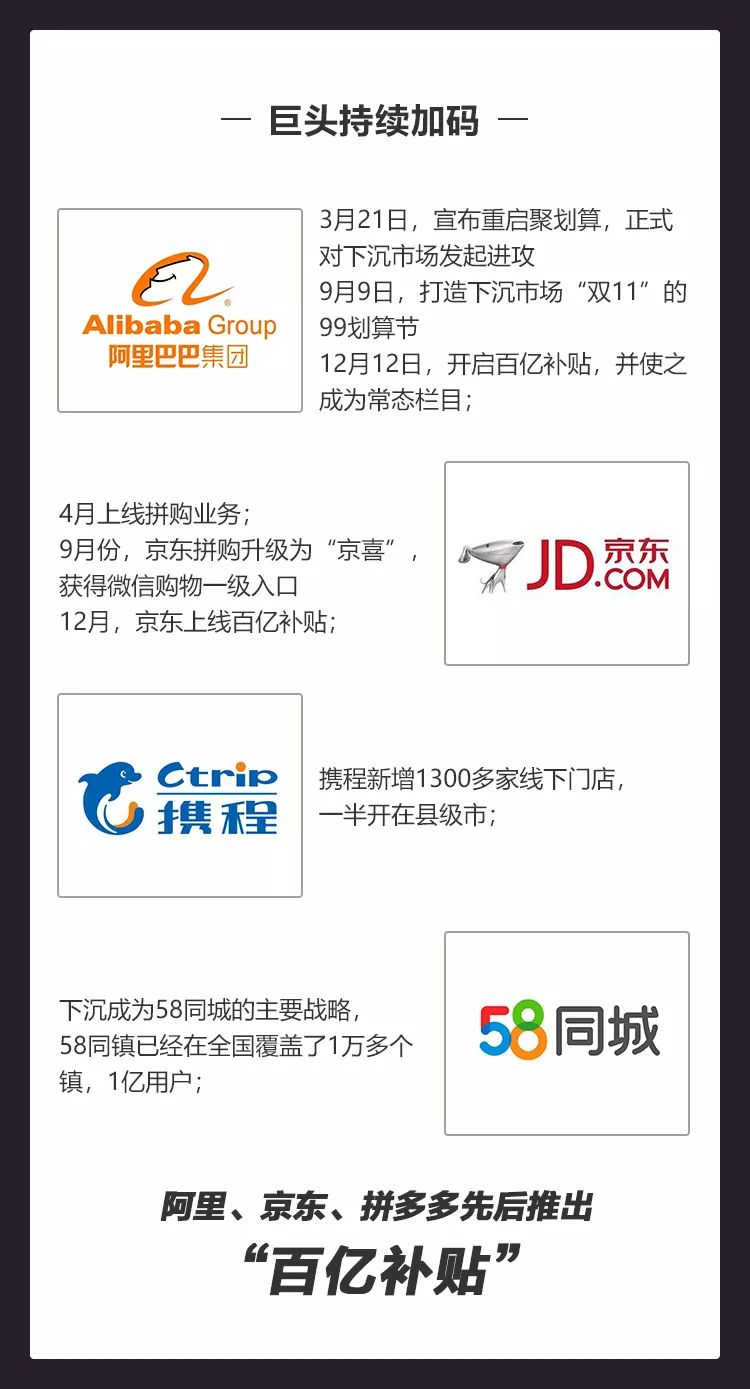In 2019, the sinking market is still very fragrant, but the logic of doing business has changed. = “_ blank”> “E-commerce Online” (ID: dianshangmj) .
Edit \ Swen
The “Sinking Market” is a treasure trove, which is no longer suspicious. But for “2017-2019”, the attention and betting chips given by the giants are unprecedented.
In 2017, the three sinking swordsmen composed of Pinduoduo, interesting headlines, and quick hands. The gameplay and content of “Chopping a Knife” and “Double-Clicking 666” still reflected Low in the perception of mainstream Internet users.
One year later, Pinduoduo and Quotiao made landfall on Nasdaq, sinking the market and entering the mainstream vision, and the giants also realized that this is a new traffic treasure. As a result, the entire Internet industry has begun a new round of “uphill and downhill” movement.
In 2019, the sinking market is still very fragrant, but the logic of doing business has changed. Cost-effective and good quality, the ultimate experience, of course, the coin subsidy to educate users must continue.
When the strategic framework is determined, all perspectives on business become strategic perspectives. The giants strengthen their deployment, team, product, marketing, ammunition, innovate and sink the market, build their own barriers, and become the final winner.
Some of them have tasted the sweetness, and some have begun to fall behind. The “sinking market” that has continued to increase in 2019 has become a trick among experts, and the competition has become fierce.
Ali Jingdong tasted the sweetness. 58, Ctrip sinks and increases.
“Sinking the market” has never left the sight of the giants.
As early as 2014, Alibaba started the rural strategy, hoping to cover the rural Taobao project to “Thousands of counties and villages” in 3 to 5 years; JD.com tried to break in through rural e-commerce and JD.com convenience stores in 2015. County and rural areas.
In the years when there were no rivals, this was nothing more than a test of the group’s new business. Until the emergence of Pinduoduo, relying on social e-commerce to highlight the encirclement from the shadows. The giants only realized that sinking the market has such great value.

In 2019, Ali and JD.com officially put on a strategic plan to sink the market.
On March 21st, Ali announced that it was a good time to restart the gathering and make it a window for China’s quality economy. Re-sharpening the “Tiantian Sword” means that Ali has officially launched an attack on the sinking market.
Within the group, the Daju Cost-Effective Business Unit has been established, which includes the three major business sections of JuChu, Taobao, and Tiantian Sale. At the entrance of the Taobao APP, the cost-effective, daily specials, and Taobao purchases have also been upgraded to first-level entrances, occupying a prominent position on the homepage.
In terms of business model, Ju is cost-effective for the reconstruction of the back-end supply chain. One is to assist the brand to sink and incubate sub-brands that are more suitable for sinking the market; , Creating the ultimate cost performance.
After gathering the banner of attacking the sinking market, Ali even created a double 11 for sinking the market: “99 Cost-effective Festival”.
At this year’s Ali Global Investor Conference, Jiang Fan, President of Tmall Taobao, revealed that 70% of the new users of Taoism are from sinking markets.
Jingdong’s emphasis on sinking markets has also risen to the strategic level. Of the three breakout directions that Liu Qiangdong set for Jingdong 2019 at the beginning of the year, the expression of “third- and fourth-tier cities” is at the top.
Liu Qiangdong mentioned on the conference call that the market performance of the third and fourth tiers has surpassed the first and second tiers. In the future, more attention should be paid to young people in towns.
In April of this year, JD.com officially launched the spelling business. One month later, the spelling business was replaced by Han Rui, the person in charge of the successful development of JD.PLUS, and an independent APP was launched.
In September, Jingdong Pinyin upgraded to “Jingxi” and won the first-level entrance of WeChat shopping in October, challenging Pinduoduo’s position in WeChat ecology.
During the Double 11 period, JD.com revealed that nearly 40% of the total new users of the station came from Jingxi, and more than 70% of them came from sinking markets such as lines 3-6.
Another giant, Ctrip, this year ’s two major strategies are sinking and going to sea. The sinking is mainly through the offline store layout. The Beijing Business Daily reported in June that Ctrip plans to recruit more than 5,000 employees and add new ones. More than 1300 offline stores, half of them in county-level cities. Through sinking, Ctrip aggregated the previous online services offline and provided them to those young people who were previously inaccessible.
58 Tongcheng ’s approach is even more radical, copying itself directly in the sinking market. “We see 58 Tongcheng as a second venture.” Yao Jinbo, chairman of 58 Tongcheng said. From its establishment in 2017 to October 2019, 58 Tongzhen has covered more than 10,000 towns and 100 million users across the country.
